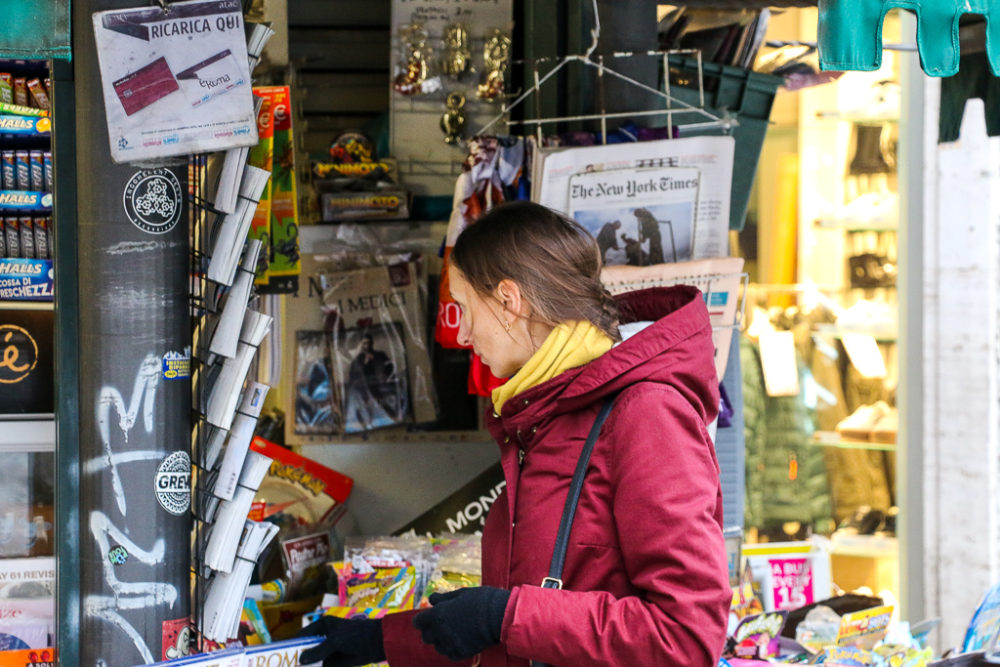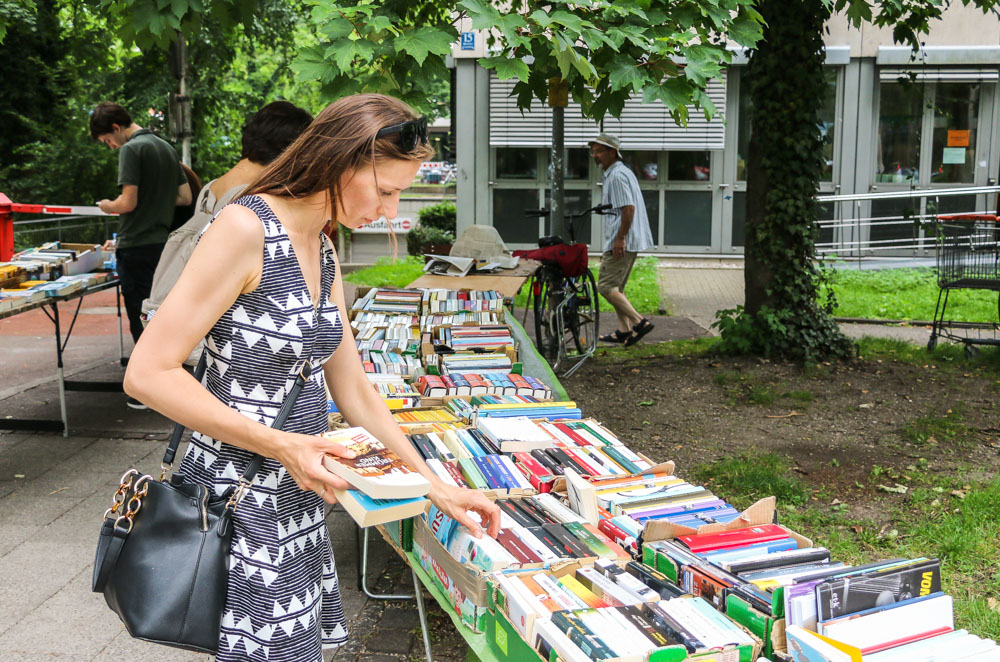Why do some of us learn a new language easily and effortlessly while others struggle endlessly?
Last updated: April 4, 2025

I Learned, Studied… and Have Almost Never Used My First Foreign Language
I stared at the menu behind the manager of a small restaurant tucked outside of the tourist area in Vienna. Bold, black letters on the white background formed into words I was familiar with. With the exception of a few nouns that I could easily guess from the context, I understood everything. Saying those words out loud, in a sentence, scared me. (It was one of those travel memories that you can never forget.)
I hadn’t used German for nearly ten years. There was a time when I would spend most of my days practicing perfect German pronunciation and molding new words into extended essays. Often instead of going straight to my dormitory room after the classes, I would sneak into the Goethe Institute, a German cultural center, where binge watching German television kept me occupied for hours on end. That little corner across the street from my university was the closest to the real-life experience I had to practice my first foreign language.
I wasn’t just obsessed with German. After learning this language throughout middle and high school, I chose it as my major at the university. I was going to be an interpreter in the international communication and political relationship sphere.
I studied hard. Too hard probably… Never letting the foreign language be fun to play with. Yet I always felt like I was behind. I knew German grammar all right. What I lacked was practice. Apart from made-up conversations with my group mates and professors in the classroom and those few hours a week of German news at the Goethe Institute, I didn’t have any exposure to real-life situations where I could polish the new language.
If You Don’t Use a New Language, You Lose It
When I moved to the United States, German drifted out of the picture entirely. Eager to learn a new language, English, which I could barely speak, even less understand, I immersed myself into the English speaking environment with all my being. Subconsciously, I shut down the sounds of any other languages, but my target language.
In a way it was a successful method as a year later I was able to go to college. My first subject wasn’t ESL (English as a second language), but Economics 101.
I still planned to start brushing up on my German later when I would be more confident with my English. That later had never come until the evening I was standing in the restaurant filled with cigarette smoke and muffled conversations.
Reviving the Lost Foreign Language
“Ok, it’s time to revive my German,” it was easier said than done. Words most certainly stumbled and tripped a hundred times before they came out of my mouth. I managed to form a simple sentence, but got completely lost on the second. The restaurant manager listened to my struggles uninterruptedly. Then, sensing that the rescue was needed, she took our orders in English.
I didn’t really need to speak the German language either in Vienna, Austria, or Munich, Germany, that we traveled to a few months later, after all. With a massive influx of tourists from all over the world, most of the locals in these cities spoke English to one extent or another.
Yes, several times my understanding of the local language saved us from getting off the train too early and even taking the right train in the first place. But that was about all. For a few more months…
A rather awkward “conversation” in one of the grocery stores in Zurich, Switzerland, reinforced my desire to “learn” the German language again. Morning coolness evaporated before we could even make our way to the Lindenhof, a public square in the historic center with spectacular views of the city. The summer heat intensified by noon and accompanied us well into the evening hours.
I needed ice cream… and food. Any food could do good at that point. Inside a large grocery store, I headed straight to a frozen food section, grabbed one coconut ice cream, and started to read the label on the back.

We Do Not Put Stuff Back
Pfft… It had milk. I put the ice cream back and was about to join Roshan at a checkout counter when one employee, in the classic German language, gave me a lecture on shopping in Switzerland.
Apparently, once you grabbed something from the shelf or refrigerator, you couldn’t put it back. She finished her speech with a smile and English: “Did you understand?” Oh, yes! I understood every single word, every construction perfectly.
What surprised me the most was not the message, but the way it was presented to me. In classic German, a language that I had learned for years. It was like I heard this language every day. I had no difficulties in understanding it whatsoever. Constructing a fluent response, however, was a problem.
Like a volcano waiting for the right time to wake up, my German was dormant up to that point as well. I hadn’t lost it after all. My German was sleeping. And when the time was right, it showed a “smoke”, a slight sign of its existence.
Learning My Third Foreign Language
For a few years after that “informative” encounter, an internal obligation to ace one foreign language before starting learning a new one pressed on me. On one hand, I had my dormant German, but no real need to use it. On the other hand, living in Southern California I had been exposed to the Spanish language almost as often as to English on a daily basis.
One day everything boiled down to one simple answer. One foreign language couldn’t hold me hostage. Learning the German language had indirectly changed my entire life. But I had no use for it, at least now… So after years of neglecting the call, I turned my eager-to-learn ear to the Spanish language. And in California, I certainly had no problems practicing and using it.

SO HOW DO YOU ACTUALLY LEARN A NEW LANGUAGE?
1. Set up Your Priorities Straight
What’s your purpose? Why do you want to learn a new language? Traveling to a country or region where this language is spoken is one of the biggest motivators. Understanding and speaking the same language opens the door to local cultures and brings you closer to natives.
The last drop that tipped my scale in favor of Spanish had, however, nothing to do with my high ambitions to travel to Spanish-speaking countries. I wanted to learn a new language to communicate with my neighbors.
About a month ago, Dylan had wanted to play soccer with his classmates after school. Why not? It was Friday. While the boys were chasing each other and the ball, I stood awkwardly near their moms. All of them spoke Spanish.
While one of the women could quickly switch from Spanish to English, the English language skills of the other two were questionable. Our conversation couldn’t extend beyond a few general phrases, such as “How are you?” “Would you like some water?”
2. Pick the RIGHT Method FOR YOU
How to learn the language is almost as important as why. For years I’d learned the foreign languages in a traditional way. I would get a book and follow instructions it outlined meticulously. As I progressed, later lessons would introduce more complicated words and phrases and more difficult grammar rules.
For a visual person like me, this method worked faster than the others. Yet still, it was not exempt from some major flaws. With the absence of hearing materials, my pronunciation suffered.
Some of the people I met during my German learning phase picked up foreign languages by watching TV. Polish came easily to one of my Ukrainian friends. He despised the traditional way of learning foreign languages. Instead he would select a movie, always with subtitles, and enjoy the show while listening and simultaneously reading. In his case, learning was the secondary act. He learned the new language through play.
A friend of my university roommate, picked up Turkish while spending one summer in Turkey. The traditional way of learning grammar followed later when she was hired by an international company as a Russian and Turkish interpreter.

3. Learn a New Language through Play
When I was learning English, I watched lots of TV, too. Yet unlike my friend who had learned Polish just by watching movies, I used this method to polish my pronunciation.
I decided to use a completely different strategy while learning the Spanish language. Instead of buying a book, I downloaded a free language learning app and let it structure my class.
The first lesson focused on learning five new worlds. Only two of them were actually new to me. I had to complete dozens of sentences with one of these words, repeating them multiple times in different structures. By the end of the first lesson, the app asked me to translate “difficult” sentences.
Yo soy una niña. (I am a girl.)
My analytical brain was confused. I almost gave up this learning method. The only thing that kept me opening the app day after day was my “commitment” to keeping 7 strikes in a row. I had to set it up along with the time I would spend on learning Spanish every day before starting the lessons.
By the end of the third 15-minute lesson, I could say those simple sentences that looked confusing the first day without thinking. And I didn’t even feel like I had started learning a foreign language. There were no piles of books waiting to be open every day. No list of words to memorize. I was just playing with the app… and learning.
4. Learn a New Language by Immersing Yourself into Environment
When I moved to the United States, I deliberately ruled against looking for Russian-speaking communities. I was determined to learn English as fast as possible. My phone settings were in English, even if I didn’t understand everything. All my books were in English.
Even credit card applications I read and filled up in English, all by myself. It took much longer for me to complete them than for any other English-speaking customer. But it all was a part of the learning process.
I never translated a new word into Russian. Instead I looked up its definition in English, collecting quite a bunch of other words that needed to be explained along the way. I wrote down and memorized as many words as I could in one day. The next day, I practiced them at work with my coworkers and customers, at a grocery store, and later at school when I decided to pursue a business degree.
English was the official language in the country I lived in now and it was easy for me to immerse myself into it. While learning German I didn’t have such a privilege. Yet with a little sacrifice and determination, a foreign language learner can always delve into a new language by subscribing to newspapers or joining an online group led by native speakers.
With the convenience of YouTube, you can discover Spanish, Italian, French, or whatever language you want to learn channels and keep watching them until you can imitate phrases and even strike up conversations with strangers. Learning a new language has never been easier than today.
READ MORE: 6 Books that Change Your Life in One Way or Another
